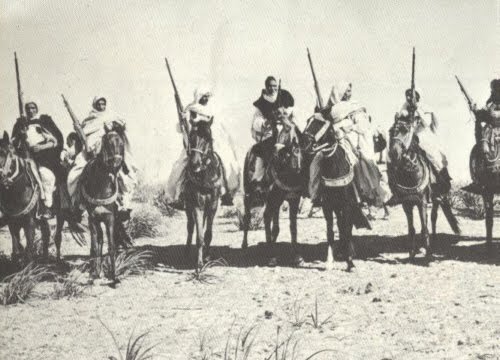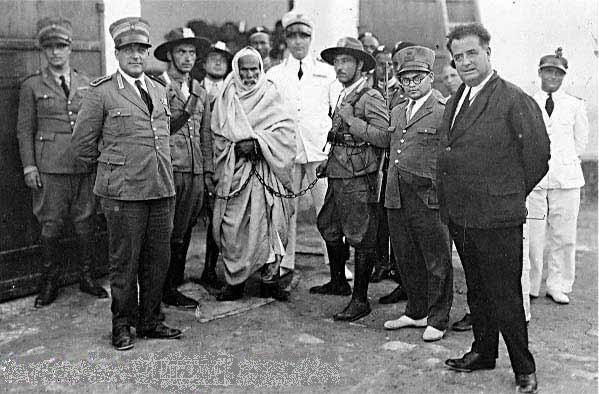 |
| Omar Mukhtar |
Many successive empires ruled present-day Libya until the Ottoman Turks conquered it in 1551. Libya remained under Ottoman control until the 1911 Italian invasion; the Italians desired it mainly as a strategic location.
British colonial forces had control of Egypt, and the French had made claims in North Africa as well. The Ottomans, whose last North African territory was Libya, were extremely weak owing to a recent evolution and were unable to defend against the Italian invasion.
Faced with bombardment by the Italian fleet under Admiral Farafelli, the Ottoman Turks abandoned Tripolitania, which the Italians easily captured. The Italian presence was made official after a Turkish-Italian treaty was signed in October 1912 giving Italy control of Libya.
  |
After World War I ended in 1918, Italy expressed its desire to construct a "Second Roman Empire" that encompassed Libya. This idea was propagated under Benito Mussolini and included the resettling of Italians in the agricultural areas of Libya along the coast as well as the construction of roads, communication lines, and military facilities throughout the country. In 1929 the Italians used the term "Libya" officially, and in 1939 they made Libya an Italian colony.
The Italian occupation was immensely unpopular in Libya. Immediately after the Italian conquest in 1911, resistance groups formed to push the Italians out. One group, the Sanusiya movement, under the direction of Muhammad Idris al-Mahdi al-Sanusi, mounted resistance to the Italian occupation. Omar Mukhtar led the most famous resistance movement.
Omar Mukhtar was born in 1862 in the town of Zawia Janzour. He was from the Mnifa tribe and a Qur'anic teacher by profession. After the Italians took over in 1911, he initiated and led a campaign against the occupation that lasted for 20 years.
 |
| Omar Mukhtar with the Libyan Mujahideen |
He fought a guerrilla war against the Italians, using his extensive knowledge of the Libyan terrain to successfully attack and harass them. Mukhtar had a strong following among Libyans, receiving food, supplies, and fighting men from the local population.
Since the Italians could not capture Mukhtar, they decided to cripple his support base by incarcerating the Libyan population in concentration camps. These horrific camps interred an estimated 125,000 Libyans, of which two-thirds perished because of the appalling conditions.
   |
The resistance continued despite the concentration camps, which only served to increase anger among the Libyans. When Omar Mukhtar was around 70 years old, he was wounded in battle and captured by the Italians. He was interrogated, tortured, and hanged on September 16, 1931.
Omar Mukhtar is a hero to the Libyans and is still revered in the 21st century. After Mukhtar's execution the Italians were able temporarily to subdue Libya until it became a battleground in World War II, during which Libya was the scene of massive desert battles between the German-Italian armies and the British-French armies.
 |
| Omar Mukhtar arrested by Italian officials |